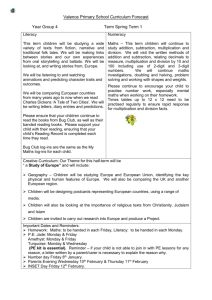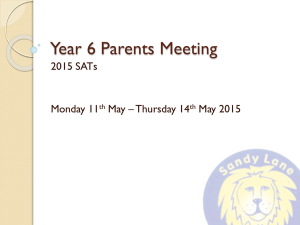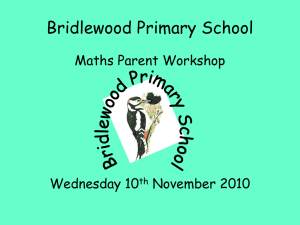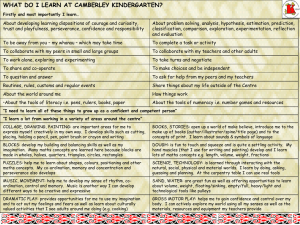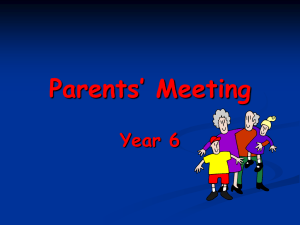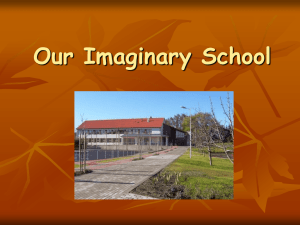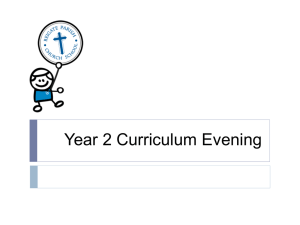Maths Presentation
advertisement
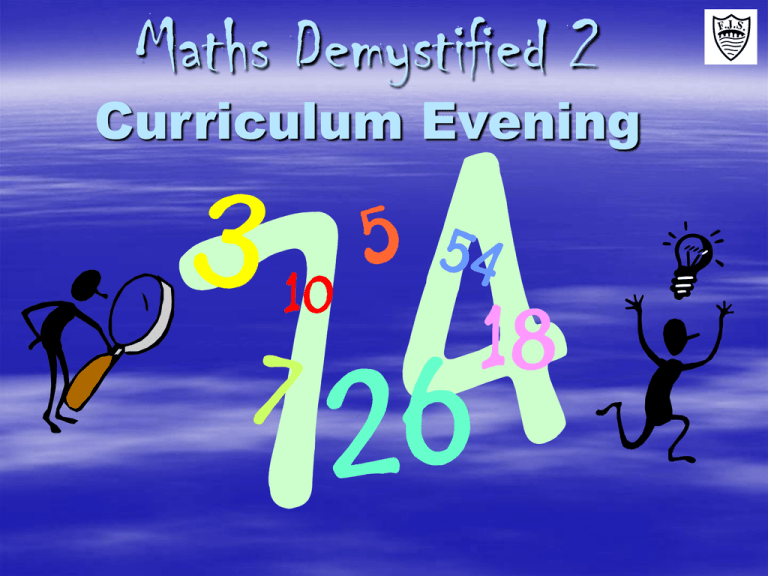
Maths Demystified 2 Curriculum Evening What’s coming up: Why have a Maths Evening? How children progress in Maths The 4 rules: how are they taught now at FJS? – Mental strategies – Written strategies Importance of problem solving How can you help your child at home? Information on further workshops for parents Working together with your child Refreshments Structure of the Daily Mathematics Lesson Mental and Oral Starter Main Input Group work Plenary Sharing and articulation of strategies is vital, also representing the strategies visually Progression in Maths Children start by learning mental methods of calculation before moving onto informal jottings (such as the number line). When these are understood the children then learn the formal layout of calculations. Moving ahead too quickly or missing a step can lead to children becoming confused and insecure. Addition Children are taught a range of strategies for adding numbers in their heads. They learn ‘number bonds’ to 10 and 100 They learn how to count on for small differences. They also learn how to add numbers that are close to a multiple of ten and then adjust such as 49 + 23 = 50 + 23 – 1= 72 Addition – Written method On the way to learning the formal written method, children learn column addition, starting with the least significant digit. Subtraction – Mental Strategies Counting on or back e.g. in 5s, 10s, 100s Counting on or back to solve problems e.g. 86-30 Partitioning (splitting the number up : one number or both) Compensating Subtracting time (non-metric) Selecting the right method Subtraction –written methods Number line Written representation of the number line (vertical) Traditional formal written method Multiplication Essential that children learn their tables (and related division facts). The booklet gives examples of games you can play at home to reinforce. Multiplication Ideally… By the end of year 3 children should know their 2, 5 and 10 times tables. By the end of year 4 children should know their 2, 3, 4, 5, and 10 times tables. By the end of year 5 children should know all their tables to x10. By the end of year 6 children should be able to give the right answer before the question is asked. Multiplication – written method One of the written methods the children learn is the grid method. This builds on their knowledge of place value and of multiplying smaller numbers. Division – mental methods Knowledge of tables – backwards and inside out 4x9=36, 9x4=36, 36÷9=4, 36÷4=9 Use of arrays Dividing by 10, 100, 1000 Halving (also ÷4 is halving and halving again) Finding fractions, decimals and percentages e.g. 1/3 of 27, 25% of £10, 0.5 x 12 Division – the importance of context 68 ÷ 8 Harry has 68 toffees he shares them between 8 friends. How many does each friend get and how many are left over? A 68cm piece of ribbon is cut into 8 equal pieces. How long is each piece? 68 scouts go on a weekend camping trip. Each tent takes 8 scouts. How many tents will they need to bring? Pencils come in boxes of 8. How many full boxes can you make from 68 pencils? Division –written methods Repeated subtraction or ‘chunking’ Problem solving Emily uses 3 silver coins to pay for an orange. The orange costs 67p. How much change does she get? The answer is 4.7cm. What is the problem? Puts Maths in a real context Allows children to investigate different ways of solving a problem There is often not just one ‘right’ answer but many possible answers How can you help at home? Have a positive view of Maths with your child Ask them to teach you what they learnt today Involve children with weighing and measuring in real contexts e.g. cooking Give them the responsibility of handling money Play maths games or games that involve Maths e.g. Yahzee, Monopoly, Card Games e.g. Cribbage, 21 or bust etc. Practise the mental arithmetic basics a little and often e.g. adding car number plates Using time e.g. You’ve got 40 minutes on your PS2 - what time do you need to stop playing? Maths is all around – make the most of natural opportunities Free Workshops For Parents Roz Bradbury Workshops Whiteboard warm up Working together with your child on an activity Refreshments in the Hall afterwards
